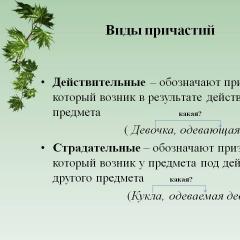What is declension: how many cases in Russian
He is great and rich, there are so many subtleties in him that it seems impossible to remember everything. In fact, there is nothing complicated. Just for each question you need to be able to find the right solution... Let's take a look at how many cases are in Russian, what questions they answer, and how easy it is to remember them.
In contact with
Definition
What is a case? First, you should familiarize yourself with the concept itself. . Death is a form that indicates relationship between words... With its help, the proposal can be coordinated and formed. For example:
- We, joy, accept, he, the team.
- We gladly accepted him into the team.
The first option is just a set of words that are in no way related to each other. In the second point, thanks to the change in form, we get holistic sentence with a formed thought.
How many cases are there in Russian? The generally accepted number is six. That is how much is offered for study to schoolchildren. However, linguists argue that the present number 15... Apparently, to simplify the system, it was decided to remove some of them from the curriculum.
Main types
All nouns are comparable to questions and auxiliary expressions. Their interaction with each other is very convenient: if you forget one thing, another can come to the rescue.
Some cases the questions are the same, and to distinguish between them, you can turn to the declensions for help.
What are the main cases in Russian.
Nominative
Used for the names of objects, has the following identifying features:
- questions who? - Mother. What? - frame;
- auxiliary expression "is";
- meets with endings in singular: I skl: -а, -я. II: -o, -e. III: ÿ;
- plural: -y, -i, -a, -i.
- Marina has always loved to read books. Who is there? - Marina (1 floor).
- The leaves trembled in the wind. Is there anything? - Leaves (1 fold).
Genitive
Identifies affiliation. To facilitate memorization of the genitive case in Russian, there are a number of ways:
- you can match it with the expression "No" who? - father. What? Of the palace;
- used with prepositions: at, around, before, with, from, near, without, from, after, about, for;
- ending in singular: I skl: -ы, -и. II: -a, -i. III: -and;
- in the plural: -ov, -ev, -ey.
- After my mother left, we were a little upset. No one? - Moms (1 cl.).
- There were no horses in the stable. No what? - Horses (plural).
Dative
Has a hint in the name itself, to convey something to someone. Its features:
- defines the last point of action;
- "Give" to whom? - to the boy. What? - a glass;
- prepositions: by, to;
- endings in a singular number: I skl: -e, -i. II: -y, -y. III: -and;
- in the plural: -am, -yam.
- Grandma didn't like our game. Give to whom? - To grandmother (1 fold).
- Running across the field was a lot of fun. Give to what? - To the field (2 sheets).
Accusative
Names the action object:
- "See" whom? - a friend. What? - hand;
- accusative prepositions: through, on, in, for, pro;
- endings in a singular number: I skl: -y, -y. II: -o, -e;
- in the plural: -, -y, -i, -a, -ya, -ey.
- The younger sister was especially pleasant to hear. I see who? - Sister (1 cl.).
- And a dog was running across the bridge. I see what? - Bridgeÿ (3rd declension.).
Instrumental
The belonging of a part of speech to this case is determined as follows:
- "Admire" whom? - spouse. How? - chain mail;
- used with prepositions: above, before, under, with, for;
- endings in singular: I declension: -o, -o, -o, -o. II: th, th. III: th: th;
- in the plural: -s, -s.
- Before which stop did you ask to stop? Admiring what? - Stop (1sl.).
- We have been friends with Lena since the fifth grade. Admiring who? - Lena (1 floor).
Prepositional
It is always used with prepositions, and also has the following properties:
- prepositions are most often used - on, at, about, in, about;
- "Dreaming" about whom? - about the fox. About what? - about the assessment;
- endings in a singular number: I skl: -e, -i. II: -e, -and. III: -and.
- plural: -ah, -i.
- My dream of a puppy has finally come true. Thinking about who? - Puppy (1 declension.).
- A birch grove grew at the court. Think about what? - Courtyard (1 declension.).
To memorize all the names, children can be invited to learn a small sentence:
- Irina
- Gave birth
- Girl
- Ordered
- To drag
- Diaper.

Table - cases.
Additional varieties of case forms
- Vocative... This could include appeals to someone created by "circumcision". Example: Mom, Dad, Tan, etc.
- Local... Prepositions: at, in, on. Answers the questions: where, on what? Example: on a nightstand in a schoolyard.
- Separating. Genitive derivative In russian language. Example: speed up, set the heat.
- Countable. Used with numerals... Example: four balls, two cupboards.
- Suspended. Indicates starting point of movement... Example: from the garden, from home.
- Lacking. For negating verbs... Example: he cannot go, he is not ready to say goodbye.
- Quantitative and definitive. It has similarities with genitive... Example: a cup of tea.
- Waiting. Example: wait for a friend.
- Transformative (inclusive). Example: become a sailor, become a stewardess.
Declension of nouns
Every noun can be declined. There are 1, 2 and 3 declensions, as well as words related to this part of speech, can be mixed. These include the words "way", "ten" and nouns ending in "me".
Declination of nouns, table.
| Case | I declension | II declension | III declension | ||
| Female genus | Husband. genus | Husband. genus | Wed genus | Female genus | |
| Nominative | Roads a | Dad a
Cost I am |
Watermelonÿ | Zhit O
Pestilence e |
Saltÿ |
| Genitive | Roads and | Dad s
Cost and |
Watermelon a
Korn I am |
Zhit a
Pestilence I am |
Sol and
Gran and |
| Dative | Roads e | Dad e
Cost e |
Watermelon at
Korn Yu |
Zhit at
Pestilence Yu |
Sol and
Gran and |
| Accusative | Roads at | Dad at
Cost Yu |
Watermelonÿ | Zhit O
Pestilence e |
Saltÿ |
| Instrumental | Roads Oh
An her |
Dad Oh
Cost her |
Watermelon ohm
Korn eat |
Zhit ohm
Pestilence eat |
Salt Yu
Edge Yu |
| Prepositional | Oh roads e
About An e |
Oh dad e
About Coast e |
About watermelon e
Oh corn e |
About life e
Oh mor e |
Oh sol and
Oh gran and |
Attention! Only the nominative case is considered direct, other indirect ones.
Cases and questions
|
Case and auxiliary word |
Prepositions |
Endings by numbers | |||||
| Unit h. | |||||||
| III floor | |||||||
| Nominative | Who? (father). What? (telephone) | My father always read a lot. The phone rang several times a day. |
No excuses | -and I | -, -o, -e | — | -y, -i, -a, -i |
| Genitive | Whom? (parents). What? (inspiration) | The parents were not in the kitchen. I had to paint without inspiration. |
Around, at, before, with, from, near, for, from, without, around, after | -y, -and | -and I | -and | -ov, -, ev, -ey |
| Dative | To whom? (to the kitten). What? (to the ceiling) | Masha poured milk for the kitten. Garlands were attached to the ceiling. |
By, to | -e, -and | -y, -y | -and | -am, -yam |
| Accusative | Whom? (friend). What? (House) | We called a friend with us. Moving to a new house did not please. |
Through, behind, in, on, pro | -y, -y | -o, -e | — | -, -i, -y, -a, -ya |
| Instrumental (admire) |
By whom? (by the artist). How? (creation) | She always dreamed of becoming an artist. For the fifth hour Katya was admiring her creation. |
Under, behind, before, with, over | -o / oy, -y / her | -om, -em | -Yu | -s, -s |
| Prepositional | About whom? (about Masha) About what? (about travel) | We didn't even remember about Masha. Mom thought about this trip for a long time. |
Oh, in, oh, when, on | -e, -and | -e, -and | -and | -ah, -I |
How easy it is to learn cases
How to easily and easily determine the case of a noun and an adjective
Conclusion
For faster and easier memorization, you just need to choose a more convenient option - visual materials. For example, for visual perception easier to work with tables and diagrams... This way, the cases and questions will not cause you any problems.


